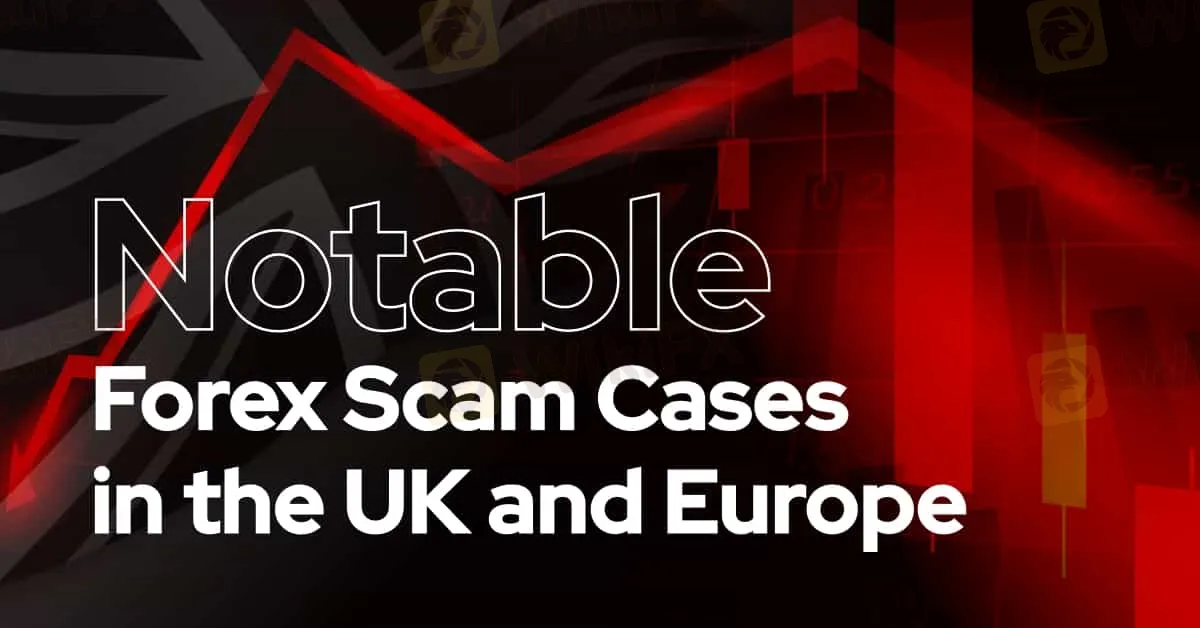简体中文
繁體中文
English
Pусский
日本語
ภาษาไทย
Tiếng Việt
Bahasa Indonesia
Español
हिन्दी
Filippiiniläinen
Français
Deutsch
Português
Türkçe
한국어
العربية
Unmasking Deceit: Notable Forex Scam Cases in the UK and Europe
Abstract:This article takes a closer look at notable cases of forex scams in the region, unraveling the tactics used and the consequences faced by unsuspecting investors.

In the ever-evolving realm of forex trading, stories of financial deception and shattered dreams have become all too familiar. The United Kingdom and Europe, known for their robust financial sectors, have not been immune to the rise of forex scams. This article takes a closer look at notable cases of forex scams in the region, unraveling the tactics used and the consequences faced by unsuspecting investors.
The Real Faces of Fraud: Notable Forex Scam Cases
Forex scams are not merely abstract threats; they manifest in the lives of individuals who have fallen prey to deceptive practices. One such case involves a fraudulent investment scheme that promised unprecedented returns, attracting investors from various corners of Europe. When the scheme eventually collapsed, it left a trail of financial ruin for those who had placed their trust in the enticing promises of profitability.
Examining the Tactics: Lessons from Real Cases
By dissecting specific cases, we gain insight into the tactics employed by scammers. In the aforementioned case, the perpetrators utilized sophisticated marketing strategies, creating an illusion of credibility through professional-looking websites and persuasive communication. Traders were enticed by promises of guaranteed profits, only to find themselves facing substantial losses when the scheme crumbled.
Regulatory Responses: The Importance of Swift Action
Notable forex scam cases often serve as catalysts for regulatory bodies to intensify their efforts. The Financial Conduct Authority (FCA) and the European Securities and Markets Authority (ESMA) play pivotal roles in investigating and taking action against fraudulent entities. These responses not only aim to hold wrongdoers accountable but also serve as a deterrent to others contemplating similar schemes.
Learning from Mistakes: Investor Education
Investor education is a crucial component of the fight against forex scams. By highlighting real cases, regulators and educational platforms can illustrate the potential risks and consequences of fraudulent activities. Traders are encouraged to exercise due diligence, conduct thorough research, and stay informed to avoid falling victim to scams.
WikiFX: Your Shield Against Scams
In the quest for a safer trading environment, WikiFX emerges as a valuable ally for traders. By offering a comprehensive database of brokers, WikiFX provides essential information about their regulatory status, user reviews, and any reported scams or fraudulent activities. Traders can leverage this knowledge to make informed decisions and protect themselves from potential pitfalls.
Are you concerned about the legitimacy of your forex broker? Visit www.wikifx.com to access WikiFX and equip yourself with the tools needed to navigate the complex world of forex trading.
Conclusion: Empowering Traders Through Awareness
Notable forex scam cases serve as cautionary tales, emphasizing the importance of vigilance and due diligence in the forex market. By learning from the experiences of others, traders can actively contribute to a safer trading environment. With the support of regulatory bodies and educational platforms like WikiFX, investors can navigate the complexities of forex trading with confidence, minimizing the risks associated with deceptive practices.

Disclaimer:
The views in this article only represent the author's personal views, and do not constitute investment advice on this platform. This platform does not guarantee the accuracy, completeness and timeliness of the information in the article, and will not be liable for any loss caused by the use of or reliance on the information in the article.
Read more

April Fool's Day Scam Prevention Experience Collection
Share your “Forex Fraud Prevention Experience”, win WikiFX points and gold rewards!

Australian Authorities Joins Forces with Philippine Authorities to Combat Cyber Scams
AFP tackles cyber scam boiler rooms in the Philippines, training police to fight fraud and protect Australians from romance and cryptocurrency scams.

Coinbase Phishing Scams Drain $46M from Users in Two Weeks
Coinbase phishing scams cost users $46M in two weeks. Learn how scammers target the crypto exchange and tips to stay safe.

Anti-Scam Groups Urge Tougher Action on Fraudsters in UK
Anti-scam groups demand tougher police action on fraudsters as UK fraud rates surge 19%, targeting millions in a penalty-free crime spree exposed by a $35m scam leak.
WikiFX Broker
Latest News
FCA Warns Against 10 Unlicensed or Clone Firms
CySEC Warns Against 14 Unlicensed Investment Websites
Top Currency Pairs to Watch for Profit This Week - March 31, 2025
Will natural disasters have an impact on the forex market?
Philippines Deports 29 Indonesians Linked to Online Scam Syndicate in Manila
Exposing the Top 5 Scam Brokers of March 2025: A Closer Look by WikiFX
Gold Prices Climb Again – Have Investors Seized the Opportunity?
Webull Launches SMSF Investment Platform with Zero Fees
Australian Regulator Warns of Money Laundering and Fraud Risks in Crypto ATMs
AI-Powered Strategies to Improve Profits in Forex Trading
Currency Calculator







